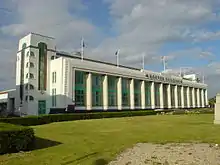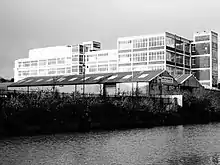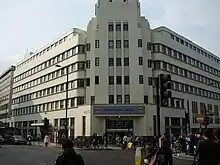Wallis, Gilbert and Partners
Wallis, Gilbert and Partners was a British architectural partnership responsible for the design of many Art Deco buildings in the UK in the 1920s and 1930s. It was established by Thomas Wallis (1873–1953) in 1916. Wallis had previously served with Sir Frank Baines in the Office of Works. Although the identity of Gilbert has not been established, architects who worked with them included James Warne and Harry Beken; later partners included Frederick Button,[1] Douglas Wallis (1901–1968), Agbolahan Adesegun (1935–2008) and J. W. MacGregor (d. 1994). Notable buildings include the Hoover Factory and the Firestone Tyre Factory. The firm also occasionally designed country houses, for instance, Limber and Ripley Grange at Loughton for Charles Frederick Clark, proprietor of the Caribonum group. The partnership was dissolved in 1945.[2]

Works


%252C_frontage%252C_Great_West_Road%252C_Brentford%252C_20050123.jpg.webp)

- Tilling-Stevens Factory, Maidstone, Kent, 1917, Grade II listed.[3]
- Caribonum Factory, Leyton, London, 1918.
- General Electrical Company Witton Works, Electric Avenue, Birmingham 1920, Grade II listed.[4]
- The Solex Factory, Marylebone Road, London, 1925.
- Wrigley's Factory, Wembley, London, 1926.
- The Shannon Factory, Kingston, London, 1928.
- EMI factory, Hayes, 1927–29
- Firestone Tyre Factory, Great West Road, Brentford, Middlesex, 1928-1929 (Demolished 1980).
- Pyrene Building, Great West Road, Brentford, 1929-1930
- Tower and extension to the 'Alaska' factory, Bermondsey, London 1930s.
- Albion Motor Car Company Ltd Works, Scotstoun, Glasgow 1930.
- India Tyre Factory, Inchinnan 1930-1931.
- Daimler Hire Garage, 9 Herbrand Street, London 1931.[5]
- British Bemberg Factory, Doncaster, Yorkshire, 1931.
- Hoover Factory, Western Avenue, Perivale 1931-1938.
- Victoria Coach Station, London, 1931-1932.
- Coty Cosmetics Factory, Great West Road, Brentford, 1932.[6]
- ASEA Factory (latterly the Hawker Siddeley Power Transformer Factory before its closure in 2003),[7] Walthamstow, 1936.
- Simmonds Aerocessories, later Beecham's Pharmaceuticals Factory, Great West Road, Brentford, 1936-1942.[8]
- Richard Klinger Factory, Sidcup, London, 1937.[9]
The firm also designed a number of bus garages for London Transport and its predecessors [10] at:-
- Addlestone, Surrey
- Amersham, Buckinghamshire
- Epping, Essex
- Grays, Essex
- Hemel Hempstead, Hertfordshire
- Hertford, Hertfordshire
- Peckham, London (demolished 1995) [11]
- Reigate, Surrey
- St Albans, Hertfordshire (in collaboration with Adams, Holden & Pearson)
- Tring, Hertfordshire
- Northfleet, Kent
- Windsor, Berkshire
Notes
- Joan S. Skinner (1997). Form and Fancy: Factories and Factory Buildings by Wallis, Gilbert & Partners, 1916-1939. Liverpool University Press. pp. 17–19. ISBN 978-0-85323-612-2. Retrieved 5 August 2015.
- "Notice". The London Gazette. No. 37436. 18 January 1946. p. 540.
- Historic England. "Former Tilling-Stevens Factory (1408072)". National Heritage List for England. Retrieved 16 February 2020.
- Historic England. "GEC Birmingham (1234517)". National Heritage List for England. Retrieved 12 May 2007.
- Daimler Hire Garage (Courtauld Institute of Art).
- Historic England, entry 1270424.
- "Former Hawker Siddeley site set for transformation".
- Wallis House (Art of the State).
- Historic England. "Richard Klinger Factory (1387704)". National Heritage List for England. Retrieved 16 March 2013.
- Glazier, K (2006): London Transport Garages, Harrow Weald, Capital Transport Publishing
- Peckham Bus station (Alternative Future Peckham).
Bibliography and references
- Curl, James Stevens (2006). A Dictionary of Architecture and Landscape Architecture (Paperback) (Second ed.). Oxford University Press. p. 880. ISBN 0-19-860678-8.
- Skinner, Joan S. (1997). Form and fancy: factories and factory buildings by Wallis, Gilbert and Partner (Paperback) (First ed.). Liverpool University Press. ISBN 978-0-85323-622-1.